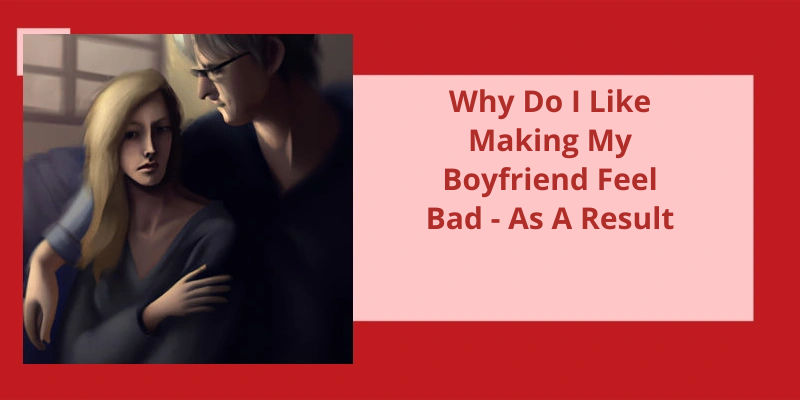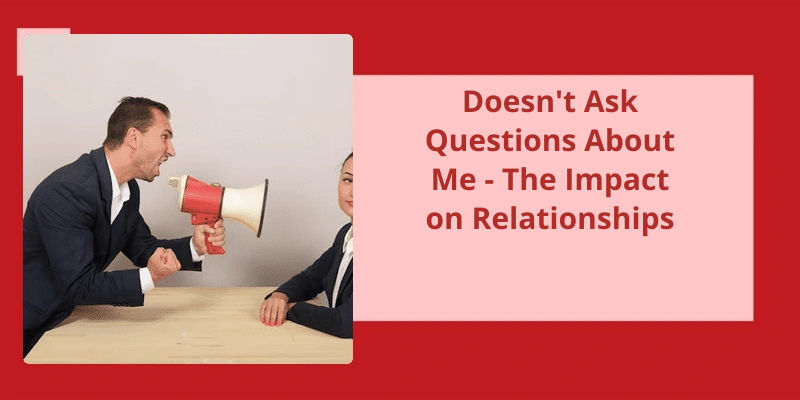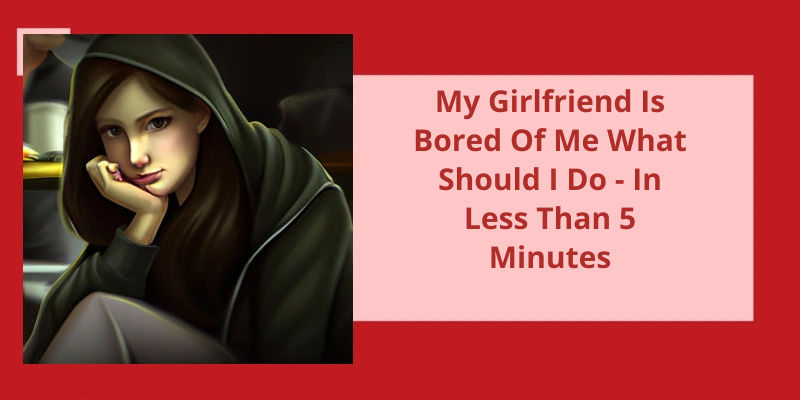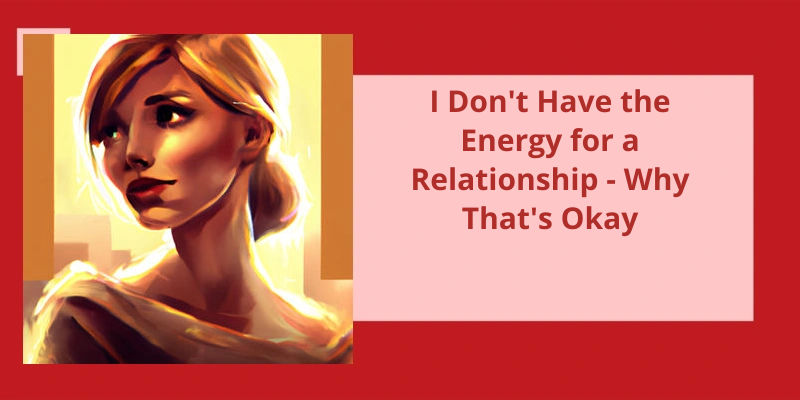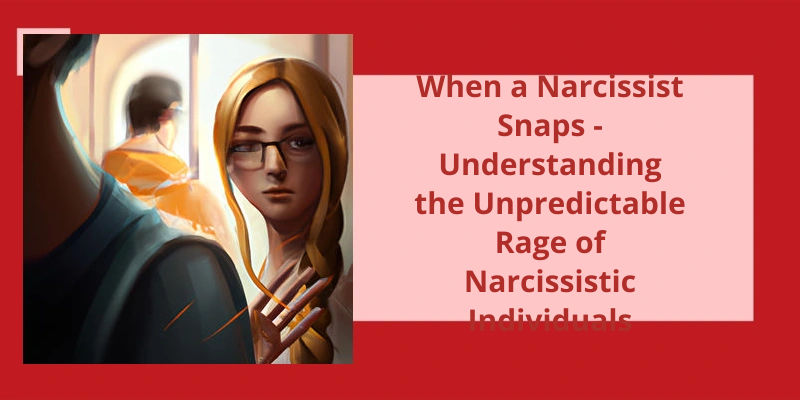In the realm of intimate relationships, it isn’t uncommon for individuals to experience complex and sometimes contradictory emotions. Often stemming from deeper psychological factors, one such perplexing emotion is the inexplicable inclination to make one's boyfriend feel bad, resulting in a mix of confusion, guilt, and fascination. While this inclination may seem counterintuitive and contrary to the foundation of a healthy partnership, it demands a closer examination of underlying motivations and psychological complexities. Exploring the potential reasons behind this perplexing phenomenon can shed light upon the intricate dynamics of relationships, illuminating the unconscious desires and unresolved issues that may be at play. By delving into the realm of human nature and interpersonal dynamics, we can begin to unravel the enigma of why individuals may find gratification in eliciting negative emotions in their significant others, ultimately striving towards a deeper understanding of oneself and the intricacies of love and connection.
When Your Partner Makes You Feel Bad All the Time?
When your partner consistently makes you feel bad, it’s crucial to recognize that this behavior falls within the realm of psychological abuse. While it’s natural for couples to occasionally upset one another due to misunderstandings or mistakes, what sets emotional or psychological abuse apart is it’s persistence and intentionality.
The effects of constantly feeling bad in a relationship can be devastating to ones emotional well-being. It chips away at your self-esteem, leaving you questioning your worth and value. This type of abuse often involves manipulation, gaslighting, and demeaning remarks, which can engender feelings of powerlessness and contribute to a cycle of self-doubt.
It’s important to remember that no one deserves to be treated this way. Healthy relationships are built on respect, compassion, and support.
Understanding why someone might derive pleasure from making their partner feel bad can be complex. It could stem from a desire for control, a need to exert power over their partner, or unresolved personal issues that they’re projecting onto the relationship. Nonetheless, it’s crucial to recognize that this behavior is deeply unhealthy and damaging to both individuals involved.
If you find yourself in a situation where your partner frequently makes you feel bad, it may be necessary to seek professional help or end the relationship altogether. Remember, you deserve happiness, respect, and a healthy emotional environment. Surround yourself with people who uplift and support you, and don’t hesitate to reach out for assistance in breaking free from the cycle of abuse.
Signs of Psychological Abuse in a Relationship

Psychological abuse in a relationship can be highly damaging and often goes unnoticed. Here are some signs to look out for:
1. Constant criticism and belittling: If your boyfriend frequently puts you down, insults you, or belittles your accomplishments, it could be a sign of psychological abuse.
2. Controlling behavior: Is your boyfriend excessively controlling? Does he dictate who you can spend time with, what you can wear, or where you can go? This controlling behavior is a form of psychological abuse.
3. Gaslighting: Gaslighting is a manipulation tactic where your boyfriend makes you doubt your own thoughts, feelings, or sanity. It can be subtle but is incredibly harmful to your mental well-being.
4. Isolation: If your boyfriend isolates you from friends and family, preventing you from having a support system, it’s a red flag of psychological abuse. Isolation makes it easier for the abuser to control and manipulate you.
5. Threats and intimidation: Does your boyfriend frequently threaten you with physical harm or intimidation? This type of behavior is a clear sign of psychological abuse and shouldn’t be ignored.
Remember, no one deserves to be treated poorly in a relationship. If you recognize any of these signs, it may be time to seek help and consider leaving the relationship for your own well-being.
Disclaimer: This content is for informational purposes only and shouldn’t be seen as a substitute for professional advice. If you or someone you know is experiencing abuse in a relationship, please seek help from a qualified professional or a helpline in your country.
Guilt can have detrimental effects on relationships, potentially leading to a breakdown in trust and feelings of manipulation. While it may seem effective in getting your partner to comply with your wishes, the long-term consequences can be damaging.
Is It Bad to Make Your Partner Feel Guilty?
Inducing feelings of guilt as a means to make your partner feel bad may initially give you a sense of control and power, but it can have severe consequences for your relationship. Manipulating someones emotions in this way can break down trust, as your partner may start to feel that they’re being used to serve your own desires. This can create a toxic dynamic where communication and honesty become compromised.
Moreover, constantly making your boyfriend feel bad can erode the emotional connection between you. When guilt is manipulated as a tool, it hampers the expression of true feelings and replaces them with a heightened sense of obligation. Your boyfriend may comply with your wishes, but it will be out of a sense of guilt rather than genuine desire or affection.
Over time, this pattern of inducing guilt can lead to resentment and negative emotions on both sides. This can result in a strained dynamic, where he may start to question his self-worth and ultimately withdraw emotionally.
These instances can occur within any relationship and can leave us confused and remorseful. Understanding the underlying factors that contribute to unintentional hurt can be crucial in preventing future incidents and fostering a healthier dynamic with our partners. In this article, we will delve into common reasons behind such actions and explore strategies that can help us navigate these challenging moments with empathy and sensitivity.
Why Do I Hurt My Partner Unintentionally?
Intentionally or not, hurting our partner is something that can happen to anyone at some point in a relationship. Often, it stems from our own frustrations and stresses in life that seep into our interactions with our loved ones. Whether it’s the pressure at work, general life stressors, or even personal insecurities, these can all contribute to unintentionally hurting our partner.
Perhaps, in the heat of the moment, we lash out or say something hurtful without realizing the impact it will have on our partner. Our emotions can cloud our judgment, making it challenging to gauge the consequences of our words and actions. It’s important to remember that hurting our partner unintentionally doesn’t define our character, but it does give us an opportunity to reflect on our behavior and grow from it.
In some cases, making our boyfriend feel bad may stem from a subconscious desire for attention or control. By eliciting negative emotions, we may be seeking a reaction or a sense of power in the relationship. However, it’s crucial to recognize that this behavior isn’t healthy or conducive to building a strong and supportive relationship.
Moreover, self-reflection is crucial in recognizing patterns of behavior that lead us to hurt our partner. By identifying the triggers and emotions that contribute to our negative actions, we can work on developing healthier coping mechanisms. Seeking professional help, such as therapy or counseling, can also provide valuable insights and guidance in navigating these challenges.
Ultimately, the key to overcoming unintentional hurt is cultivating a strong sense of empathy and compassion for our partner. By actively listening, validating their feelings, and being mindful of our words and actions, we can foster a supportive and loving environment in our relationship. It takes effort and self-awareness, but with dedication and understanding, we can grow as individuals and as a couple, mitigating unintentional hurt in our relationship.
Developing Healthy Boundaries in Relationships to Prevent Unintentional Hurt
- Recognize your own needs and emotions.
- Communicate your boundaries clearly and assertively.
- Practice active listening to understand others’ boundaries.
- Be respectful of others’ boundaries and avoid crossing them.
- Take responsibility for your own actions and behavior.
- Learn to say no when necessary and prioritize self-care.
- Set realistic expectations for yourself and others.
- Seek support from trusted friends or professionals if needed.
- Regularly assess and reassess your boundaries as relationships evolve.
In addition to gaining a sense of control, there may be underlying motives for hurting our partner emotionally, such as protecting ourselves from further harm in the relationship.
Why Do I Like Hurting My Partner Emotionally?
In some cases, hurting our partner emotionally can stem from a deep-seated need for control. By inflicting emotional pain, we believe that we’re gaining power over the other person and the situation at hand. This sense of control gives us a temporary relief from our own feelings of vulnerability and insecurity. It becomes a strategy to protect ourselves from potential harm or disappointment in the relationship.
If our partner has already caused us pain or betrayed our trust, we might resort to hurting them back as a way to regain a sense of balance or even the upper hand. It becomes a twisted attempt to level the playing field or to ensure that we aren’t the only ones suffering.
Instead of openly addressing these emotions and seeking healthy resolutions, we may choose to express our discontentment through hurtful words or actions. This destructive behavior can be an outlet for our suppressed emotions, allowing us to vent our frustrations and dissatisfaction onto the other person.
Deep down, we may fear intimacy or commitment, and by causing emotional pain, we inadvertently create distance in the relationship. It becomes a way to push our partner away and protect ourselves from the vulnerability and potential heartbreak that come with genuine emotional connection.
Ultimately, understanding why we like making our partner feel bad requires introspection and self-reflection. Exploring our own motivations and emotional patterns can help us address any underlying issues and seek healthier ways to communicate and connect in our relationships. Remember, a healthy relationship is built on trust, understanding, and compassion, not on hurting one another emotionally.
The Potential for Change and Growth in Overcoming the Desire to Hurt Our Partner Emotionally and Fostering Healthier Relationship Dynamics
- Developing emotional intelligence
- Practicing empathy and understanding
- Effective communication strategies
- Building trust and mutual respect
- Seeking professional help or counseling
- Seeking personal growth and self-awareness
- Embracing forgiveness and letting go of grudges
- Setting healthy boundaries
- Committing to personal and relationship goals
- Cultivating a supportive and loving environment
These thoughts can be distressing and confusing, but they don’t mean that you actually want to harm your partner. Instead, they’re a result of the brain’s misfiring and misinterpretation of threatening stimuli. It’s important to seek professional help and understanding to navigate these intrusive thoughts and manage OCD effectively.
Why Do I Think About Hurting My Partner?
It’s important to note that these thoughts don’t reflect your true desires or intentions. They’re a product of an anxiety disorder that causes intrusive thoughts. While it may be distressing to have these thoughts, it’s crucial to remember that they aren’t a reflection of your character or your feelings towards your partner.
Why do I like making my boyfriend feel bad? This question suggests that there may be underlying issues in the relationship that require exploration and understanding. It’s essential to identify the root causes of these feelings and address them in order to foster a healthy and loving relationship.
Communication is key in any relationship. Openly discussing your thoughts and feelings with your partner can help both of you gain a better understanding of the situation. It’s important to approach these conversations with compassion, empathy, and a willingness to work together towards a solution.
Seeking professional help from a therapist or counselor can also be beneficial. They can provide guidance and support in navigating the complexities of your thoughts and emotions. Mental health professionals can help you develop coping strategies and techniques to manage intrusive thoughts and improve your overall well-being.
Remember, everyone experiences intrusive thoughts from time to time, but when they begin to cause distress or interfere with daily functioning, it’s crucial to seek help. By addressing these thoughts, you can work towards creating a loving, supportive, and fulfilling relationship with your partner.
Conclusion
In examining the question of why someone might enjoy making their boyfriend feel bad, it becomes clear that there are no simple answers. Human emotions and motivations are complex and often influenced by a myriad of factors, including past experiences, insecurities, and psychological dynamics within the relationship. It’s possible that some individuals may derive a sense of power or control from making their partner feel bad, while others may be seeking validation or attention. Additionally, unresolved personal issues or an unhealthy coping mechanism may contribute to this behavior. However, it’s crucial to recognize that intentionally inflicting emotional pain on a loved one is neither healthy nor constructive in a relationship. Open communication, empathy, and a willingness to address underlying issues are essential in fostering a mutually respectful and supportive partnership.

